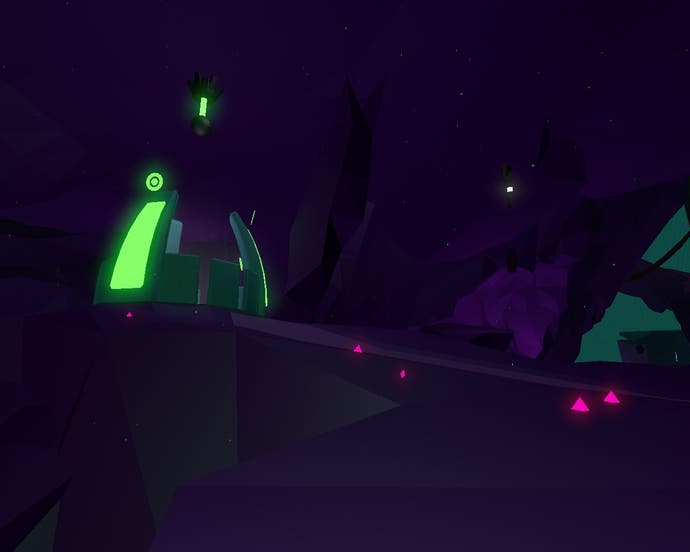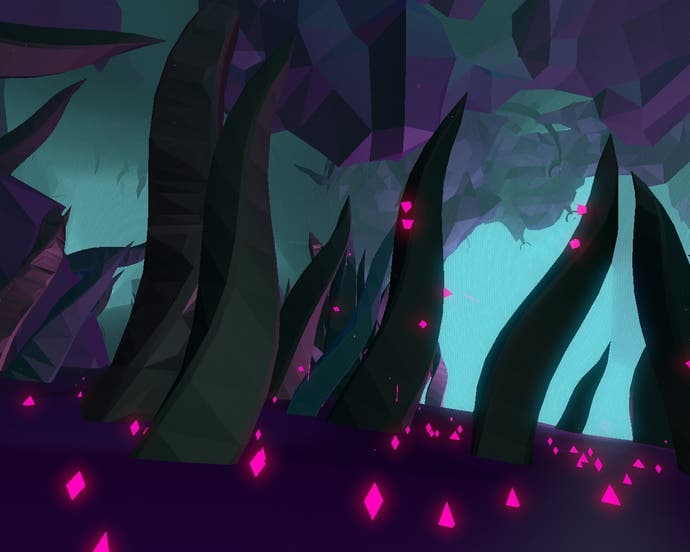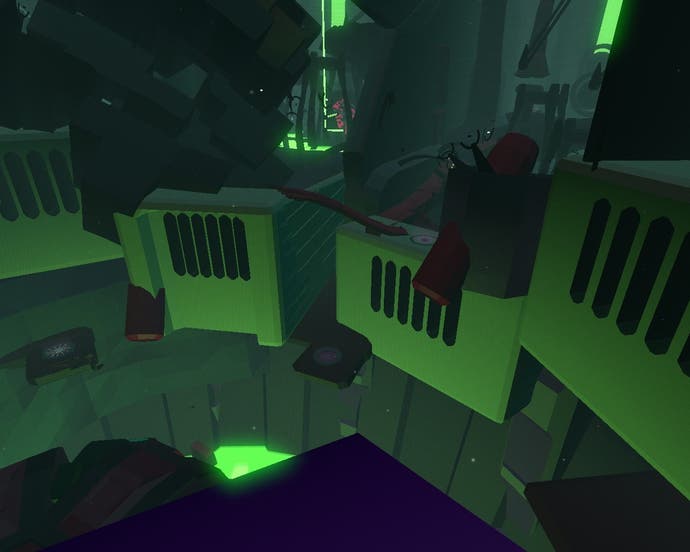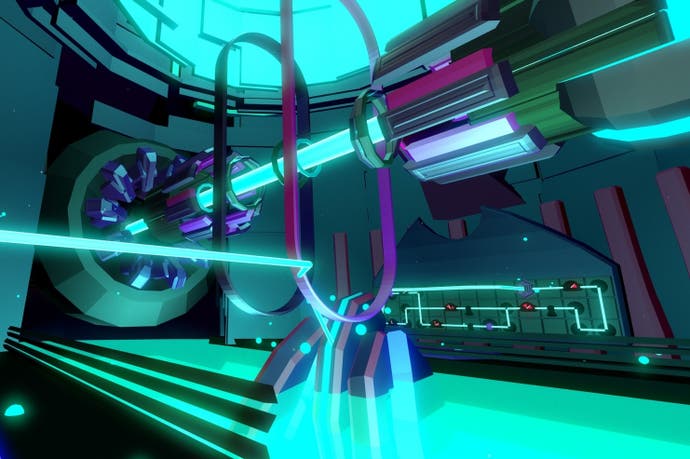Fract OSC review
Stranger in a strange land.
Given the right setting, curiosity can be all the motivation you need to be drawn into a game world. Forget map markers and quest icons, all you really need is a world that compels you to keep moving deeper inside it. That was the simple idea that drove games like Journey and Proteus and even Minecraft, and it's the same primal instinct that's at the heart of Fract OSC. You proceed because you want to see what lies over the horizon, not because there's a carrot dangled in front of it.
There are elements of platform gaming and puzzle-solving here, but mostly Fract is about exploration. It drops you into a stark and surreal landscape with no explanation as to why you're there or what you need to do and then leaves you to it. What instruction there is comes in the opening area, which acts as a basic tutorial in how to manipulate objects in the environment. That done, you're whisked off to an even stranger place and left to your own devices.
Comparisons to Proteus may send up red flags for anyone not fully on board with the whole "art games" movement, but Fract is more obviously a video game in its design. The challenges you'll face are familiar at their core, but rendered peculiar by their context. How do you reach that interesting looking spot? What do you need to do to make this machine work? These are comforting reminders of objective-based play, but the game doesn't enforce them too strictly. The most interesting parts of the world require you to engage more fully with its mysteries, but you can simply roam at will if you like.

There is "death" here, though it's only ever momentary. Falling into giant pits of neon green or falling through gaps into ominous red will see you reset to the last checkpoint station in a burst of pixels and static, with no lasting penalty. Otherwise, there are no display elements to tell you how you're doing or when you've done something meaningful, and certainly no handy indicators to let you know that you've activated three out of five thingamajigs.
If you're guided by anything, it's light and sound. The unsettling alien landscape glows and moves as you approach, lights detach from the ground and float upwards, shards and beams slide into place, while ambient noises are triggered by your presence. Quite quickly, you begin to subconsciously use these cues to let you know when you're on the right path - insomuch as Fract has a "right path".
The combination is fairly intoxicating. Fract's world is gorgeous and peaceful, but also quite sinister. This is partly down to the carefully pitched strangeness of its geometric shapes, creating a sense of place that is always somewhere between organic and artificial. There are buildings and machines, but they're like nothing you've seen before. You recognise enough to intuit what their purpose might be, but so much is weird and otherworldly that you're constantly second-guessing yourself. There's enough that is familiar for your imagination to grab a tentative hold of, but nothing so predictable that you'll ever feel confident in your grasp of what's happening. Like all great interactive experiences, this is a game that happens almost entirely in your own head, an ongoing internal narrative that pushes and pulls between questions of how and why that are never given an easy resolution.

The sound underpins all of this perfectly. Ambient and electronic, it has roots that stretch from the BBC's pioneering 1960s Radiophonic Workshop all the way up to the squelching soundscapes made popular by Warp Records. The connection between you and the sound is never as explicit as in Proteus - it doesn't feel like you're making music by moving through the world, rather that the world is making music if you're in the right place to hear it. There's a subtle but important barrier there, a reminder that you're an interloper granted access to this place, not a part of the eco-system making it tick. It's therefore not a music game, as such, but the audio is nevertheless the glue that binds the Fract experience together.
It's also, in its own offbeat way, one of the most exciting horror games in years. Horror in gaming is too often mired in cheesy clichés; monsters and spectres infesting gloomy asylums and forests, sprays of blood on hospital walls and cheap jump scares. Fract is often beautiful, but also quite chilling. There's an existential dread to the game, a sort of deep bass note of panic beneath the highs of awe and wonder, that is unlike anything I've played. Given the visuals and the ambient sound it should be relaxing, but it's not. There's a constant anxiety, a sense of vulnerability and peril, that keeps you off-kilter.
There are no fish-men, no elusive glimpses of indescribable Old Gods, but precisely because it avoids the obvious stereotypes and instead concentrates on disquieting tone and mood, I actually think there's a strong case to be made for Fract being the greatest representation of H P Lovecraft in gaming.
If H P Lovecraft had been a coder rather than a writer and had been into Autechre and Aphex Twin rather than gross racism, this is the sort of game he would have come up with

As I explore Fract's canyons and plains, grand halls and claustrophobic caverns, I'm reminded of "lines and curves that could be made to point out directions leading through the walls of space to other spaces beyond" and "the geometry of the dream-place... abnormal and loathsomely redolent of spheres and dimensions apart from ours". If Howard Philip had been a coder rather than a writer and had been into Autechre and Aphex Twin rather than gross racism, I can't help thinking this is the sort of game he would have come up with.
If you haven't guessed by now, this isn't an experience where gameplay comes packaged up in nice big clearly marked and numbered boxes. Fract is a game that gives back only what you're willing to put in, and even then there are moments of frustration when the stark absence of clues, hints or anything resembling signposts leaves you traipsing around the same area over and over. The sweet moments of realisation that follow are the only compensation you'll get, the opening up of entirely new mind-boggling vistas your only reward. If that doesn't sound like a fair trade-off, steer well clear.
If you do like games that challenge you to work out the rules for yourself, to find the edges of the world by falling over them, then Fract is a unique and often remarkable experience, best savoured in the dark at full volume. Go on, get lost.

